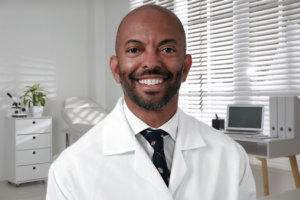Ralph Highshaw grew up with an innate love of helping people. At the age of five years old, he was inspired to become a medical doctor. His family supported this dream throughout his life, encouraging him to study hard and learn as much as he could about biology, chemistry, and anatomy.
By the time Ralph graduated from the University of Southern California, he knew what direction he wanted to take his medical career. He began a surgical residency in urology and aligned his studies in order to focus on that branch of medicine. As such, he eventually became part of the oncology and urology residency team at MD Anderson Cancer Center. He spent much of his life in California, but later relocated to a few other states in pursuit of his ultimate goal of practicing medicine professionally. After spending time in many different states, he fell in love with Florida and settled there.
During his journey to become a medical doctor, Ralph A. Highshaw M.D. came to better understand general wellness, and became inspired to apply this knowledge to every part of his practice. He firmly believes that the application of general wellness will move the healthcare industry forward and yield better patient outcomes. This belief has led him to involve himself in certain verified clinical trials in that realm which show great promise. Among other subjects, he has written articles reflecting on the beneficial aspects of functional integrative medicine.
These days, Ralph A. Highshaw, M.D. continues to practice medicine, dedicating himself to improving the lives of his patients in myriad ways, from advocating preventive wellness to administering traditional medical treatments. When not working to advance the welfare of his patients, Ralph enjoys spending time with his wife, family, friends, as well as playing tennis and reading.
What was the inspiration behind your business?
It was the desire to help patients feel and do better in life. It’s always been my hope to help them reach their optimal health and feel better than when they first came to see me.
What defines your way of doing business?
I address every patient as family and treat them as I want to be treated. I concentrate on communicating well with them to find out how best to help, as that is the best way to start the process of assisting the patient to do better overall.
What keys to being productive can you share?
In my experience, it’s all a mindset. From a young age, I’ve always been active, and I’ve always engaged in many things all at once. I enjoy operating with a high level of energy. From a professional standpoint, my productivity stems from working with patients, creating surgery plans, and customizing treatment plans. It takes practice and knowledge to do all of these things, but my concern for my patients and my love for what I do makes it all worth the effort. I always ask myself to make the most of every single day, and to accomplish all my tasks to the best of my abilities.
Tell us one long-term goal in your career.
My goals are always evolving, but they always center around helping patients with their health problems and removing that burden from their lives. If I can make it so there’s one less thing that they’re concerned about, there’s a better chance that they’ll find good habits that they’ll stick with to better their health.
How do you measure success?
I measure my success in terms of happiness, which I define by overcoming obstacles and achieving a given goal. Life presents many challenges as I pursue my goals, which range from spending time with family to being a better husband, father, and friend to being the best possible doctor for my patients. Anytime I can overcome one of those challenges, I feel successful.
What’s the most valuable lesson you’ve learned through the course of your career?
The most valuable lesson I’ve learned is to handle what’s in front of me—be it a patient or another sort of problem—before going on to the next item of business. For the sake of argument, let’s say the problem in question has to do with a patient. Their problem will still be there if I don’t get it right, so I believe it’s best to take the time and make the effort to solve it correctly for their sake. As a doctor, I’ll feel better about it and so will the patient.
What advice would you give to others aspiring to succeed in your field?
Conduct yourself as professionally as you possibly can, and be the best practitioner for patients in your field as you possibly can. You’ll need to recognize a requirement for constant evolution and study to keep up with the changes in medicine as the science progresses. Doing this will allow you to offer the best care for your patients.
What are some of your favorite things to do outside of work?
I’m a very active person. Exercise helps me to stay focused mentally. In particular, I enjoy playing tennis. Playing tennis ultimately helps me handle patients and my own family better, as a result of the rejuvenation I feel after a well-played match or practice session. I also enjoy reading books that improve my mind and challenge me to become a better person.
How would your colleagues describe you?
Well, I would leave that up to my colleagues, but I’ve been told that I’m a good physician based on their references. It all comes down to treating others how you would like to be treated.
How do you maintain a solid work life balance?
It’s something I’m always working on. It involves a combination of family, exercise, and study in order to be the best medical practitioner possible for my patients. Sometimes, one of these elements takes more time and effort than the others, but I always go back to assess where that balance lies to ensure I’m not prioritizing one of them over the others too much. I also have a wonderful wife who helps keep me in line in this regard.
What is one piece of technology that helps you the most in your daily routine?
It’s an old device, but it’s really prevalent: the pen and paper. From an early age, I always wrote things down to plan out what I wanted to do. And throughout my life, it’s been a means for me to organize my thoughts and actions to prepare a battle plan for whatever I want to accomplish. It leads to a better mindset, better focus, and better facilitates determining a course of action to achieve my goals. When you write out what you want to do, it’s the first step in making it real.
What has been the hardest obstacle you’ve overcome?
I would say that achieving a work life balance has been the most difficult obstacle that I’ve overcome in my career. My wonderful wife would attest to that. We’ve had a great balance for the past few years based on what she’s told me, but for a while in the early part of our relationship, I would just work and my family life would suffer. Now, I listen more, both to my family and to myself. It’s easy to overdo it one way or the other, so you need to be careful and monitor things to achieve balance in the long run.
What is one piece of advice that you have never forgotten?
You can always improve yourself, no matter what. Progress is progress, no matter how small it may look at the moment. Progress builds over time. Stay in the present. There is always tomorrow.
Read more:
Getting to Know You: Ralph A. Highshaw, M.D.
















